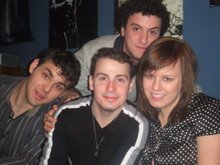“They’re going to have to do hardcore programming. We have a whole set of classes that were disguised so as to not turn people off,” said Information Technology professor Scott Fielder. “We have a class called ‘game dynamics’, which is code for physics. We have ‘numerical computing’, which is code for math.”
Students might be interested in storytelling and graphics, but Fielder wants them to realize the magnitude in which sciences and math play in developing a video game.
“If you really want to write video games, if you’re sincere, you have to be educated,” he said. “And then I’m smiling about the whole thing, thinking the skills they’re learning here are applicable to almost anything other than video gaming, but my hook to try to drag these guys in is gaming. I wish I could call it ‘Really hardcore programming for hyper-intelligent people’ but then no one would come.”
Game programming is in its first year at
“I went in there very arrogantly and just said, ‘
The heart of it lies in its focus on the essentials.
“One of the things we’re separating ourselves here at
As for competing with other established programs in the gaming realm, such as the International Academy of Design and Technology, Fielder is not worried about setting his students up for employability upon graduation.
“I don’t want to compete with them at all. That school is focusing on the art of the game, the storytelling of the game. We’re the geeks and geeks get paid well,” said Fielder. “There are a few companies here in town, there are a whole bunch in places like
Students of game programming may be worried about being trapped in a “guinea-pig” year, but seem confident about the skills they will have learned after receiving their diplomas.
“For a student coming out of a brand new program that doesn’t have a reputation, we’re going to be setting a reputation and, also, we’re going to have to go against other schools that have really good reputations for this kind of course,” said John Borthiry, first-year game programming student. “As for beating them when we’re done, that’s really up to us.”
Borthiry, 25, heard about the program through his mother, who works at the Ontario College Application Service. Borthiry, who was in the general arts and sciences program last semester, has no regrets about choosing
“I’ve talked to one student that went to (International Academy of Design and Technology), and he was very impressed with it. But hearing what he’s going through, by reading the course outline over the next three years, it sounds like a lot of the same stuff,” said Borthiry. “I know
Game Programming is six semesters and graduates receive an advanced diploma. Domestic tuition fees for 2007/2008 are $2,877.16 with additional fees for computer labs. For more information, contact Muthana Zouri at 416-675-6622, extension 4422.

No comments:
Post a Comment